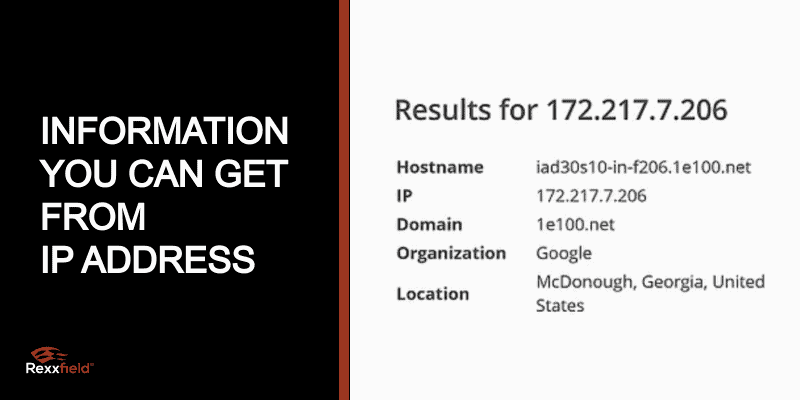In our digital ecosystem, nearly every online activity leaves a trail, and central to that data trail is the IP (Internet Protocol) address. It's a series of numbers assigned to each internet-connected device, providing a digital fingerprint that can be a vital lead in the digital world of sleuthing. But can IP addresses truly aid in an investigation? This blog post explores the pivotal role IP addresses play in the modern investigative process.
What is an IP Address and Why is It Important In Investigations?
An IP address is not just a random string of numbers. It is an essential marker identifying each internet-capable device, be it your home router, smartphone, or office network. In the realm of digital investigations, IP addresses serve as critical clues that investigators and law enforcement agencies can follow. Like breadcrumbs in the digital forest, they lead to the devices that perpetrators use, potentially unraveling identities and activities.
The importance of IP addresses in investigations cannot be overstated. They are the investigative links to the digital space, turning abstract online activity into concrete leads. Here’s why they’re considered essential:
- Identifying digital footprints: Every time someone connects to the Internet, their IP address can reveal a wealth of information, from basic geography to more detailed user behavior.
- Tracing back to the user: Scrutinizing connection logs from an IP address can lead to an ISP, which with the appropriate legal mandate, can disclose the individual or entity behind an IP address.
- Establishing behavior patterns: IP addresses register online footprints, which can then be analyzed to discern times of online activity or networks of contacts—information crucial in painting a picture of a suspect’s online habits.
Investigate an IP Address
When delving into an IP address during an investigation, the process is multi-faceted, involving:
- Identifying the Owner: All roads lead back to the Internet Service Provider (ISP), who, under legal compulsion, can match an IP to a person or entity.
- Location Tracking: While IPs don't offer GPS-like precision, they do give a general sense of whereabouts, which can be pivotal in an investigation.
- Digital Evidence: As a form of digital evidence, IP addresses can tie suspects to specific online behaviors – from accessing prohibited content to partaking in cybercrime.
- Time-Stamping: ISPs can timestamp activity on an IP, lending a temporal dimension that could verify or nullify claims and alibis.
IP Address Context
To understand the full context of an IP address, consider the following points:
- Communication Gateway: At its core, an IP address is a unique identifier essential for devices to communicate and exchange information on the internet.
- Lead to Location: It can reveal a device or individual’s location, providing leads crucial for law enforcement or private investigators.
- Track Digital Footprint: One IP address can unravel an individual’s digital movements, aiding in establishing patterns or connections vital to an investigation.
- Collaborative Efforts: Extracting valuable information from IPs often entails collaboration with ISPs, who can tie IPs to customer accounts.
- Limitations and Pitfalls: However, IP data is not infallible. Dynamic IP assignments, VPNs, and IP spoofing can create false leads, making the true source of activity harder to pinpoint.
Prevalence
Let’s examine the significance of IP addresses in digital investigations:
- A Cyber-Sherlock’s Tool: IP address tracking is a routine part of modern investigations due to the prevalence of digital footprints in cybercrimes.
- Statistical Spike: There's been a noticeable increase in cybercrime directly correlating to the need for competent IP address tracing in forensic analysis.
- Law Enforcement Dependency: Agencies increasingly gather IP data to crack cases ranging from identity theft to online harassment, recognizing its evidentiary value.
- Legal Relevance: IP logs frequently stand as substantial evidence in court, cementing their standing in successful criminal prosecution.
- Linking Suspects to Crimes: The ability to attach a suspect to a criminal act through an IP address can notably increase conviction rates.
IP Address Insights
The insights gleaned from an IP address can be extensive:
- Location Clues: Understanding where a digital action originated can be invaluable to an investigation, with geography offering substantial leads.
- Usage Patterns: Service provider logs open a window into the timing and sequence of actions, linking them to potential suspects through IP timestamps.
- Behavior Mapping: By correlating IP addresses with different accounts and digital traces, patterns of behavior and associational links can become clear.
- Tech Savviness Detection: Identifying VPN or proxy use is crucial as it may signify an attempt to circumvent tracking, hinting at higher-stakes deception.
- ISP Collaboration: In warranted cases, law enforcement can petition for user details corresponding to an IP address, establishing a link between online behavior and real-world identities.

Can an Individual Be Tracked Down Using Their IP Address During an Investigation?
IP addresses can be a beacon to the whereabouts of individuals:
- Collaborative Tracking: Law enforcement often works in tandem with ISPs to trace users, cementing connections between digital trails and physical locations.
- Log Availability and Legal Authorization: The efficacy of tracking hinges on ISPs’ records and the legal permits that facilitate their access.
- User Ambiguity: Tracked IPs might not offer an unequivocal identification due to shared usage or the commonplace shifting of dynamic IPs.
- Evasion Tactics: Tech-literate individuals might obscure their IPs using VPNs or proxies, presenting challenges to direct detection.
How Do Investigators Obtain IP Addresses Legally?
Securing an IP address within the confines of the law involves:
- Lawful Request to ISPs: The legal system and ISPs work together, with the ISPs maintaining an assignment and activity log of IP addresses.
- Legal Instruments: Subpoenas or court orders compel ISPs to disclose pertinent data when they might otherwise be disinclined to cooperate without a mandate.
- Administrative Strategies: In cybercrime scenarios, administrative subpoenas can mandate ISPs to disclose necessary information without establishing probable cause.
- Probable Cause and Warrants: Warrants, borne from probable cause linking an IP to illicit activities, grant access to comprehensive connection records.
- Lawful Network Interception: In high-stakes cases like national security or organized crime, court-sanctioned surveillance can capture IP-related traffic directly from the networks.
Is It Possible for an IP Address to Be Disguised or Hidden During an Investigation?
Masks over IP addresses are possible but not impenetrable:
- VPNs: By routing traffic through different servers, VPNs conceal users' real IPs, presenting false leads.
- Proxy Servers: These intermediaries hide user IPs by submitting internet requests on their behalf, shielding personal IPs from view.
- The Onion Router (TOR): Offering strong anonymity, TOR encrypts user data multiple times through relay networks, making tracking extremely challenging.
- IP Spoofing: A tactful cybercriminal may alter packet headers, camouflaging their traffic as originating from another IP, complicating the tracking process.
- Forensic Expertise and ISP Cooperation: Regardless of these obfuscation techniques, experienced investigators, with the help of ISPs, can strip away the digital disguises to reveal the user behind a hidden IP address.
What Kind of Information Can an IP Address Reveal About a Person or Entity In the Context of an Investigation?
An IP address can expose various details that are often crucial during an investigation:
- Geographical Location: It’s possible to ascertain the general physical location where a device accessed the internet, which can lead to important regional insights.
- Identity and Contacts: When combined with additional data, an IP address might help piece together a puzzle of a user's identity, their internet behavior, and connections.
- ISP Customer Records: Legal warrants pressure ISPs into releasing logs that pinpoint which customer was associated with a specific IP at any given time.
- Behavioral Sequencing: IP analysis can reveal patterns of internet use, adding another layer to a behavioral profile that may hold significance in an investigation.
- Link to Illegal Acts: Tracing IPs used in unlawful activities can peel back layers of criminal networks, pinpointing culprits and revealing the extent of their operations.
Final Words on the Role of IP Addresses in Investigations
From serving as digital breadcrumbs to acting as key pieces of forensic evidence, the role of IP addresses in modern investigations is both expansive and profound. While they're not the golden key to every case, in the complex digital landscape, IP addresses provide crucial starting points, clues, and corroborating evidence. As criminals evolve, so does the art of digital investigation, with the understanding and utilization of IP addresses central to unlocking the mysteries that occur within the unseen tunnels of the internet.

Still Curious? Check Out Our Other Blogs:
 |
|
 |
|
 |
Overcome the Nightmare: Essential Strategies for Dealing with Sextortion Scams Successfully! |

